#yuwen tong
Explore tagged Tumblr posts
Text
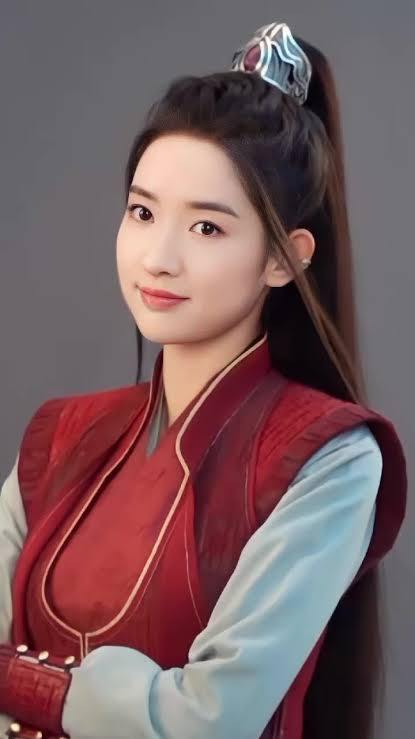

Love a strong, beautiful and skilled female ml who can look after herself and outshines other male ml's. Her story is so well portrayed that you cant help but fall in love with her.
#zhao xin tong#xintong#female leadership#dual spear weilder#chinese drama#wuxia#tiger and crane#cdrama#this beautiful woman#wang yuwen
78 notes
·
View notes
Text
For CDRAMA SATURDAY, we are currently watching 2022's UNCHAINED LOVE and having a great emotional time.
DO YOU LIKE MAIN CHARACTERS WHO ARE GOBLINS?

NO, NOT HIM.

This is Bu Yinlou (Chen Yuqi) and Wei Wuxian can only dream of having the goblin survivor energy of this woman. Her father thinks she's disposable. Her half-sister hates her. Her father's main wife actively works to have her killed. This is mainly just backstory for the first episode where she is scheduled to be ritually hung along with all the other concubines of the recently deceased emperor. She has multiple levels of schemes to get out of her fate and is not thrown when one fails. This woman is a gambler and a schemer and a bluffer and just wants to live a quiet life eating good food and playing mahjong and cards. In one of last Saturday's episodes she was kidnapped by her recently married half-sister and not only was she able to go home at the end of the day, but she was forced to leave while in possession of all of her half-sister's dowry and spending money. We would kill for this woman but we would not have to.
DO YOU LIKE A MALE LEAD WHO IS LEARNING WHAT FEELINGS ARE FOR THE FIRST TIME?

NO, NOT HIM but yes Dylan Wang.

Xiao Duo is the eunuch and one of the most terrifying figures in the country, the real power behind the throne of the recently deceased emperor and moving pieces around to ensure that continues. He's not actually a eunuch, he's not actually Xiao Duo, and everything is in service of eventually killing the man responsible for his brother's death. It's a plan years in the making. He is hopelessly in love with Bu Yinlou within episodes of meeting her and every wild, goblin thing she does makes him love her more. He puts all his plans at risk not so he can be with her but so she doesn't have to be somewhere she doesn't want to be. He learns arts and crafts for her. He offers to have her entire family executed if she gives him the word. He's a human puppy covered in metaphorical blood and also sometimes actual blood.
DO YOU LIKE SIDEKICK ROMANCES?

Tong Yun (He Nan) and Cao Chunang (Wang Yue Xin) are utterly devoted to their respective masters. Cao Chunang is the only one who knows Xiao Duo's secrets and wants him to be happy but also to survive long enough to get his revenge. Tong Yun wants to protect Bu Yinlou from the infamous Xiao Duo and then protect her from becoming deluded by the allure of a pretty face with the absence of a dick. Cao Chunang learns the impossible allure of a woman who is a goblin. Tong Yun may yet learn there are more important things to a man than whether he has a penis.
BUT WAIT DO YOU WANT A C COUPLE AS WELL THAT ARE A BIT FUCKY WITH THEIR GENDER ROLLS?

Murong Wanwan (Guan Chang) is the emperor's sister. Yuwen Liangxu (Han Haotian) is the little brother of a scheming nobleman with his eye to overthrowing the emperor who is being held politely prisoner. When Wanwan dominates Yuwen Liangxu on the basketball court, he falls helplessly in love with her and devotes his entire braincell to getting her attention.
IS IT TRAGIC?
I DON'T KNOW DON'T TELL ME.
LADIES BE SCHEMING. MEN BE SCHEMING. SOME MEN BE TAKING ANCIENT CHINESE FANTASY T-BLOCKERS. EVERYONE IS BEAUTIFUL AND A LOT OF THINGS HURT but Bu Yinlou and Xiao Duo are as amazing when they think they're in a romcom as they are when they're being a deadly team.
Bu Yinlou just got a dog that she named Eunuch Ba.
5 notes
·
View notes
Photo

However, since you are not willing to remain a confused fool, then why not become a sad, but understanding person?
Ashes of Love (Chinese tv series, 2018)
#ashes of love#香蜜沉沉燼如霜#heavy sweetness ash-like frost#yuwen tong#chinese drama#chinese tv#cdrama#c-drama#gif
50 notes
·
View notes
Photo
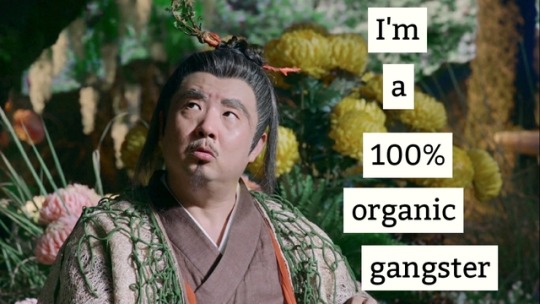

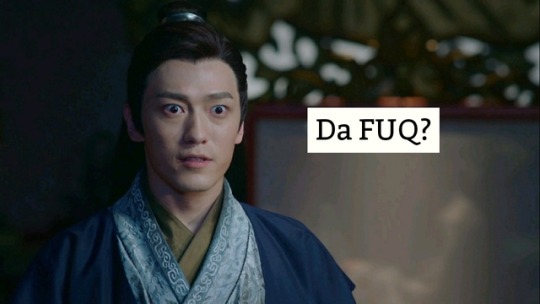
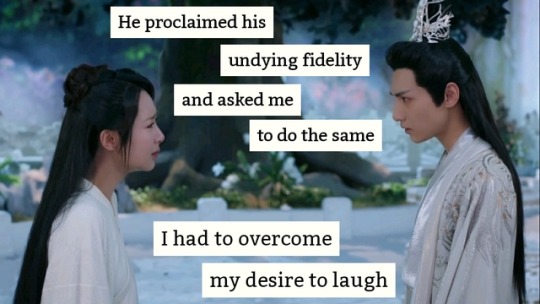
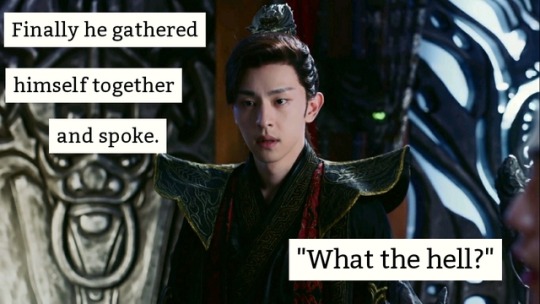
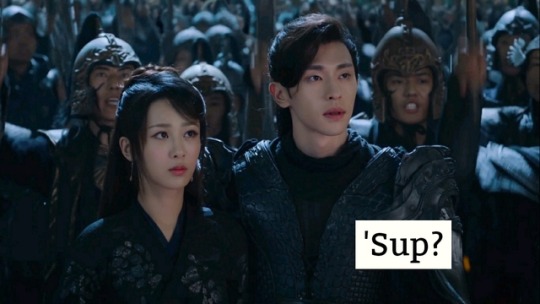
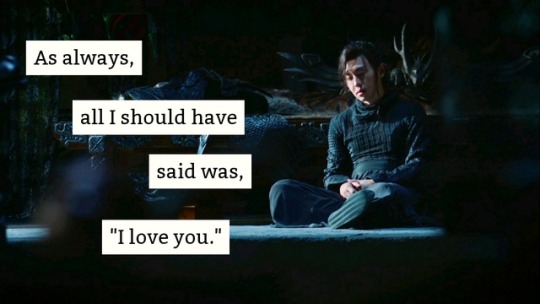
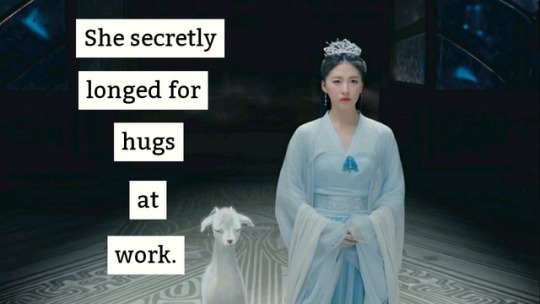

Ashes of Love Characters as Troubled Birds--Part 3
Part 1 | Part 2
Buy me a coffee?
#ashes of love#xu feng#jin mi#run yu#kuang lu#lao hu#liaoyuan#deng lun#yang zi#luo yunxi#du yuchen#zhang junran#yuwen tong#cdrama#troubled birds
105 notes
·
View notes
Text
Nirvana in Fire Character Reference Sheet Roughly in the Order Those Characters Are Introduced
For @howdydowdy, as promised, and for anyone else who, like me, is terrible at names and needs some kind of “Who?? Ohhh right. That guy.” reminder.
Basically, my Nirvana in Fire Journey started with me watching half the first episode, being wildly confused, realizing I was in over my head re: names and thus deciding to go back to the beginning and watch it again But Taking Notes This Time. I watched the whole show with a notebook and pen at my side. I figured I may as well spare you all the labour by typing it up.
As more information was revealed, I often added it to a character’s initial note, but by and large I’m leaving those extra notes out so you can experience the joy and confusion and anguish of New Information yourself. The exception to this is generally a person’s name, title, and position. E.g. Duke Qing’s name, Bai Ye, isn’t mentioned until a number of episodes after he’s first mentioned, if I recall correctly, but knowing that the person named “Bai Ye” is the same person called “Duke Qing” is exactly why I took these notes for myself in the first place.
Basically this isn’t intended to be a character guide that lays out exactly who a person is, their relationships to the other characters, and their place in the story, but rather something you can look at whenever someone mentions a name that jogs your memory just enough for you to be able to place to person. Which is why the notes tend to be either the context in which the person was introduced or the relationship through which they’re introduced.
Some names and notes are inherently spoilers, but hopefully by virtue of the fact that this is broadly in the order a character is first mentioned/introduced, you can avoid spoilers simply by not scrolling down too far. For those persons where their name or an alter ego comes in significantly after their initial introduction and is a spoiler, they are listed a second time starting with the “new information” and with the note in italics indicating their original entry (there aren’t a lot of these, don’t worry).
I will readily admit that some of my handwritten notes are just a name and then a blank space because apparently I just never actually added a note for them. I haven’t bothered adding those people here. Yes it’s because I’ve forgotten entirely who they are, but I’m pretty sure that means you’ll be okay if you immediately forget who they are too. (That being said, I get the sense there are actually relevant people missing from this list. As the show carried on and introductions became less frequent, remembering them became less difficult.)
The List
Lin Xie –> Commander of the Chiyan Army
Lin Shu –> “Xiao-Shu” –> Lin Xie’s son –> Mei Changsu --> Chief of the Jiangzuo Alliance --> Su Zhe
Lin Chen –> Young Master of Langya Hall –> NOTE: The “Lin” of Lin Chen and the “Lin” of Lin Xie & Lin Shu are both written and pronounced differently. These people are not related.
Northern Yan’s 6th Prince –> Now Northern Yan’s Crown Prince
Minister Xu –> Da Liang’s envoy to Northern Yan
Prince Yu –> Xiao Jinghuan –> 5th Prince of Da Liang
Xiao Xuan –> Emperor of Da Liang
Empress Yan --> Prince Yu’s adoptive mother
Consort Yue --> Crown Prince’s mother
Grand Empress (Dowager) --> Emperor’s grandmother
Xiao Jingxuan --> Crown Prince of Da Liang --> metonym is “Eastern Palace”
Zhuo Dingfeng --> Master of Tianquan Manor
Zhuo Qingyao --> Eldest son of Zhuo Dingfeng --> guy on the horse and later the guy helping the old couple on the boat and later also the guy who calls Xie Yu “father-in-law” (I am telling you this specifically because I am not bad at faces but this guy added so much confusion to my life that was cleared up the moment I realized these people were the same person. And also because my mother is terrible at faces and for like 15 episodes every time he showed up in another random place I would say “that’s horse and boat guy” and she would say “wait what? really???” So I’m assuming at least one other person will share in this struggle)
Xie Yu --> Marquis of Ning
Qin Banruo --> Prince Yu’s strategist
Duke Qing --> Prime Minister --> Bai Ye
Ji Ying --> member of Double Sword Sect
Li Gang --> member of Jiangzuo Alliance
Fei Liu --> Mei Changsu’s bodyguard
Yan Yujin --> Son of Empress Yan’s brother
Xiao Jingrui --> Eldest son of Xie Yu
Mu Nihuang --> Commander of the army in Yunnan --> Princess of Yunnan’s House of Mu
Xie Bi --> Second son of Xie Yu & Xiao Jingrui’s younger brother
Mu Qing --> Mu Nihuang’s younger brother
Xia Dong --> An officer of the Xuanjing Bureau
Nie Feng --> Xia Dong’s late husband --> Vanguard General of the Chiyan Army under Lin Xie
Meng Zhi --> Commander of the Imperial Guards
Xuan Bu --> From Da Yu --> stronger than Meng Zhi
Gao Zhan --> Emperor’s chief eunuch
Fei Changshi --> Prince Yu’s guy out looking for Mei Changsu
Prince Jing --> Xiao Jingyan --> 7th Prince of Da Liang
Concubine Jing --> Mother of Prince Jing
“Xiao-Xin” --> Attendant to Concubine Jing
Grand Princess Liyang --> Xie Yu’s wife & Emperor’s sister
Eunuch Zheng --> Eunuch who is mean to Tingsheng
Prince Qi --> late Crown Prince of Da Liang --> Xiao Jingyu
Tingsheng --> servant boy caught reading
“Lao-Wei” --> Mu Qing’s subordinate of some kind
Wei Zheng --> member of Chiyan Army at Battle of Meiling (and survived)
Sima Lei --> member of Royal Guard --> Consort Yue’s preferred suitor for Mu Nihuang
Liao Tingjie --> Son of the Marquis of Zhongsu --> Empress Yan’s preferred suitor Mu Nihuang
Baili Qi --> Mu Nihuang suitor from Northern Yan --> A favourite of the 4th Prince of Northern Yan
Lady/Madam Zhuo --> Zhuo Dingfeng’s wife
Xie Qi --> Zhuo Qingyao’s wife & Xie Yu’s daughter & Jingrui’s sister
Consort Hui --> bullied by the Empress
Young Lady Zhen (I think is what my handwriting says) --> servant being sneaky at late dowager empress’s palace
“Wu-momo” --> older servant with the Bad Wine
Consort Chen --> now dead --> son was a rebel
3rd Prince of Da Liang --> Xiao Jingting --> Prince Ning --> disabled
6th Prince of Da Liang --> no ambition
9th Prince of Da Liang --> too young to fight for throne
Former Crown Princess --> late Prince Qi’s late wife
“Qi-momo” --> Grand Princess Liyang’s senior attendant
Gong Yu --> window lady who works with Mr. Shisan --> a musician
Mr. Shisan --> member of Jiangzuo Alliance --> connection to Lin family
Minister Lou --> Lou Zhijing --> Minister of Trade/Finance/Revenue/other words that mean “money” --> Knows about the corpse well --> Crown Prince’s faction
Zhang Jing --> Owner of corpse well house (Lan Mansion) at the time the corpses ended up in the well
Shi Jun --> Servant at corpse well house at relevant time --> has record book
Magistrate Gao --> Gao Sheng --> The Capital Magistrate
Princess Xuanji --> ruler of a previous dynasty --> founded the “Hong Court”
Minister Qi --> Qi Min--> Minister of Justice --> Prince Yu’s faction
Minister He --> He Jingzhong --> Minister of Personnel --> Prince Yu’s faction
Minister of Public Works --> Prince Yu’s faction
Minister Chen --> Chen Yuanzhi --> Minister of Rites --> Crown Prince’s faction
Minister of Defence --> Li Lin --> Crown Prince’s faction
Bai Xun --> Duke Qing’s brother
Lie Zhanying --> Staff Officer under Prince Jing
Qi Meng --> One of Prince Jing’s men --> fights Fei Liu and commits Great Offence
“General Bian” --> One of Prince Jing’s men
Shen Zhui --> Acting Minister of Finance
Princess Qing He --> Shen Zhui’s mother
Cai Quan --> Works at Ministry of Justice --> Did well-received report on the Bing case
Han Zhiyi --> Works at Ministry of Justice --> worked on Bing case
Zhang Jianzhen --> Works at Ministry of Justice --> worked on Bing case
Wei Yuan --> Works at Ministry of Justice --> worked on Bing case
Yuan Shiying --> Works at Ministry of Justice --> worked on Bing case
Qin Yue --> Works at Ministry of Justice --> worked on Bing case
Tong Lu --> Vegetable cart guy --> brother of one of the corpse well girls
Qiu Zhe --> Son of Count (Duke?) Wen Yuan
He Wenxin --> Son of Minister He --> dislikes Qiu Zhe
Grand Prince Ji --> Emperor’s youngest brother --> Owns hot springs
Yang Liuxin --> A dancer
Hong Xinzhao --> Has “understanding girls”
Xinliu & Xinyang --> Brothel sisters --> their younger brother was murdered by Qiu Zhe
Princess Consort --> Lanjin --> Prince Yu’s wife
Zhou Xuanqing --> renowned scholar
Li Chong --> former Imperial Tutor --> former teacher to Lin Shu
“Brother Zhao” --> Canal transport guy --> Jiangzuo Alliance
Lin Xiangru --> famous literary envoy
Marquis Yan --> Yan Que --> Yan Yujin’s father & Empress Yan’s brother
Lin Yueyao --> Prince Qi’s mother --> Consort Chen
Zhen Ping --> Jiangzuo Alliance --> sword challenger
Xia Qiu --> An officer of the Xuanjing Bureau
Xia Chun --> The most senior of the officers of the Xuanjing Bureau
Prince Jingli --> Consort Hui’s son
Yuwen Xuan --> Prince Ling --> A prince of Southern Chu
Yuwen Nian --> “Niannian” --> A princess of Southern Chu --> student of Yue Xiuze
Yuwen Lin --> King of Southern Chu --> Yuwen Nian’s father
Ouyang Chi - Head of CApital Patrols
Xia Jiang --> Head of the Xuanjing Bureau
Li Chongxin --> Schoolteacher assassinated by Zhuo Dingfeng
Jun Niang --> former member of “Hong Court” under Princess Xuanji
“Miss Liu” --> Granddaughter of former Chief Secretariat Liu Cheng
Wei Qi --> The general at Jiaxing Pass --> was Xie Yu’s lieutenant for years
Su Tianshu --> Chief of Yaowang Valley --> 7th on the Langya Rich List
Su Xuan --> Su Tianshu’s adopted son --> Wei Zheng
Yun Piaomiao --> Su Xuan’s wife
Concubine Xiang --> Prince Yu’s birth mother
Zhu Yue --> Head of the Review Court --> Prince Yu’s brother-in-law
Cheng Zhiji --> Elder Master of Feng Hall --> 75 years old
Princess Linglong --> A princess of the Hua Kingdom --> Princess Xuanji’s sister --> Concubine Xiang
Grand Princess Jinyang --> Lin Shu’s mother & Lin Xie’s wife --> Emperor’s sister
Yao Zhu --> Official Fan’s servant who knows The Secret
Official Fan --> Harbouring Xia Jiang
#nirvana in fire#it's an imperfect tool basically#but hopefully it's useful anyway#if there are any spelling errors#blame it on my handwriting#you don't want to know how much time i spent looking at these notes asking myself if something was a 'u' or an 'n'
25 notes
·
View notes
Text

Ended up drawing Merxat in different roles
So uh…from the top left to the bottom left: Tong Yao (I think), yu ming, fan Lian, Yuwen yong, you tong
His eyes are just so bright that I got lost in them, and ended up just doodling him
0 notes
Text
Book of Jin 109: Biography of Murong Huang
You should really read these entries as embedded in the relevent Zizhi Tongjian entries for the best context. This post is more to have everything included in one place. I didn’t include the Chinese text this time because of the length, especially for some of the petitions.
Murong Huang, styled Yuanzhen, was the third son of Murong Hui. He had a regal countenance with broad and even teeth, and he was seven chi eight cun tall. He was bold and resolute, as well as very crafty and cunning. He esteemed learning and the Classics, and he was skilled at reading the heavens. When Murong Hui became Duke of Liaodong, he selected Murong Huang as his heir.
At the beginning of the Jianwu reign era (~317), the Jin court appointed Murong Huang as Champion General, Worthy Prince of the Left, and Marquis of Wangping. He often led troops on campaign, and was invariably successful. At the end of the Taining reign era (~325), Murong Huang was further promoted to General Who Pacifies The North and Duke of Chaoxian.
When Murong Hui died (in 333), Murong Huang inherited his position. The Jin court appointed him as General Who Pacifies The North and provisional Inspector of Pingzhou, and he was granted authority over the domain.
Not long afterwards, Yuwen Qidegui was driven out of his domain by his subordinate Yuwen Yidougui, and he fled and died away from his land. Murong Huang led troops to attack Yuwen Yidougui. Yuwen Yidougui feared him and asked for peace, and so Murong Huang merely constructed the cities of Yuyin and Anjin on the border of their territory before returning.
Earlier, the General Who Establishes Might, Murong Huang's elder brother by his father's concubine, Murong Han, had proved himself to be a heroic and talented general, and so Murong Huang had long been jealous of him. His younger brothers by his own mother, the General Who Conquers The Caitiffs, Murong Ren, and the General of Broad Valor, Murong Zhao, had also greatly received his father's favor, and Murong Huang was also uneasy about them. Following Murong Hui's death, these brothers were all afraid that Murong Huang would not be able to put up with them. At this time, Murong Han fled to seek refuge with Duan Liao.
Murong Ren urged Murong Zhao to raise troops and depose Murong Huang. Murong Huang killed Murong Zhao, and sent envoys to discover the truth about Murong Ren's intentions. The envoys encountered Murong Ren as he was attempting to cross a river. Murong Ren then knew that his plot had been discovered, so he killed his brother's envoys and returned east to his base at Pingguo. Murong Huang sent the General Who Establishes Valor, his younger brother Murong You, his Marshal, Tong Shou, and others to campaign against Murong Ren. Murong Ren led all his forces to oppose them; Murong You and the others were defeated, and they were all lost to Murong Ren. The Prefect of Xiangping, Wang Bing, and the general Sun Ji rebelled against Murong Huang in Liaodong, while the Colonel of Eastern Yi Tribes, Feng Chou, the Army Protector, Yi Yi, the Chancellor of Liaodong, Han Jiao, the Administrator of Xuantu, Gao Xu, and others all abandoned their cities and fled back to Murong Huang’s base. Murong Ren thus controlled all territory beyond the Liao river. He proclaimed himself General of Chariots and Cavalry, Inspector of Pingzhou, and Duke of Liaodong. The Yuwen clan, Duan Liao, and other Xianbei clans all sought to aid him.
In the ninth year of Xianhe (334 AD), Murong Huang sent his Marshal, Feng Yi, to attack the Xianbei leader Mudi at Bailang, and sent his General Who Displays Might, Shu Yu, to attack the Wuhuan leader Xiluohou at Pinggang; both of these foes were killed.
Murong Huang's 材官, Liu Pei, attacked Duan Liao’s territory at Yilian, but he could not take it. Duan Liao thus attacked Tuhe, but Murong Huang sent Zhang Meng to attack him, and he defeated Duan Liao.
Duan Liao's younger brother Duan Lan and Murong Han attacked Liucheng. Murong Huang's Commandant, Shi Cong, attacked and defeated them. More than ten days later, Duan Lan and Murong Han again besieged Liucheng. Murong Huang sent his General Who Calms Distant Places, his younger brother Murong Hann, Feng Yi, and others as reinforcements. Murong Huang warned his brother, "The enemy army’s morale is high, and it will be difficult to engage their vanguard. You should be careful to keep your forces intact; do not lightly rush into battle. You must keep your soldiers together while you prepare your defensive arrangements, and only afterwards attack the enemy." But Murong Hann had a headstrong temperament, and he sent more than a thousand cavalry on ahead as the vanguard. Although Feng Yi ordered a halt, Murong Hann would not listen. They were defeated by Duan Lan, and more than half of his men were killed. Duan Lan then attacked Liucheng again, employing flying ladders and tunnels. He besieged the city for twenty days. Shi Cong then personally led his soldiers to march out and attack him, and he defeated Duan Lan, taking fifteen hundred heads. Duan Lan then retreated.
During this year (334), Emperor Cheng sent his envoys, Xu Meng, Lü Qiuxing, and others bearing staffs of authority to appoint Murong Huang as Grand General Who Guards The Army, Inspector of Pingzhou, Grand Chanyu, Duke of Liaodong, Credential Bearer, and Commander. He was granted the authority to wield authority over his domain and confer his own appointments on subordinates, just as Murong Hui had done before him.
Murong Huang campaigned in Liaodong, and he captured Xiangping. Murong Ren’s appointee as Prefect of Jujiu, Liu Cheng, surrendered that city to Murong Huang. A native of Xinchang, Zhang Heng, arrested the Xinchang county officials and also surrendered. The other officials appointed by Murong Ren were all executed, and the major families of Liaodong were divided up and relocated to the capital Jicheng. Murong Huang established the counties of Heyang, Wuci, and Xile before returning.
In the seventh year (335), the seventh month, Murong Huang made his son Murong Jun his heir.
At the beginning of the Xiankang reign era (~335), Murong Huang sent Feng Yi to surprise attack the Yuwen leader Yuwen Sheyi; Feng Yi captured many of the enemy before returning. Yuwen Sheyi led light cavalry to pursue Feng Yi and fought him at the Hun River, but was again defeated.
Murong Huang planned to campaign against Murong Ren using the water route (that is, across the Sea of Bohai). His ministers all remonstrated with him, believing that the water route was too perilous, and that he should take the land route instead. But Murong Huang said, "Up until now, the sea could never be traversed, but ever since Murong Ren's rebellion, it has frozen over three times. In former times, Emperor Guangwu of Han was able to achieve the grand design by crossing the frozen Hutuo River. When Heaven may be offering me such an opportunity, how can I refuse it? Thus have I decided, and let anyone who argues otherwise part with his head!"
(When Emperor Guangwu of Han was fleeing from his enemies, he once sent a subordinate ahead to the Hutuo River to see if it was frozen enough to cross over. Upon inspection, it was not frozen enough to support the army. But when the official returned, he lied and told Liu Xiu that it was. Miraculously, when Liu Xiu’s army reached the river, it had indeed frozen enough for his army to cross. It broke apart as the last of the cavalry crossed it, so his enemies could not pursue him.)
Murong Huang led the three armies from Changli out to march across the ice. Murong Ren had not been concerned about Murong Huang coming at him from such a direction, and so his scouts did not report the enemy’s arrival to him until Murong Huang was already within seven li of Pingguo. Murong Ren then rushed out to offer battle, but Murong Huang captured him. He killed Murong Ren and then returned.
Duan Liao sent his general Li Yong to surprise attack Wuxing at night. However, Li Yong encountered rain, and when he tried to retreat, Murong Huang's Commandant, Zhang Meng, pursued and attacked him, capturing him.
Duan Lan led tens of thousands of soldiers to camp at Qushuiting, preparing to attack Liucheng, while Yuwen Yidougui marched to attack Anjin, to support Duan Lan’s invasion. Murong Huang sent fifty thousand horse and foot to attack Yuwen Yidougui while leading another army to Liucheng, and Duan Lan and Yuwen Yidougui both retreated. Murong Huang sent Feng Yi with light cavalry to pursue, and Feng Yi attacked and defeated them, taking much of their equipment and twenty days’ worth of grain before returning. Murong Huang said to his generals, "These two villains must be ashamed that they retreated without any success, so they will certainly return to try again. We should lay an ambush in wait near Liucheng." He sent Feng Yi with cavalry to prepare ambushes on the roads through Mount Ma'er. When Duan Lan’s cavalry indeed arrived, Feng Yi attacked them from both sides, greatly defeating them, and killing the general Rong Bao.
Murong Huang sent his combined Chief Clerk, Liu Bin, and his Prefect of the Household Gentlemen, Yang Jing, to escort Xu Meng and the other Jin envoys back to Jiankang.
Murong Huang sent his heir Murong Jun to campaign against Duan Liao's cities, while Feng Yi attacked the Yuwen tribes; both achieved great victories and returned.
Murong Huang established the Woodblock of Accepting Remonstrations, as a means to receive candid criticism.
After shifting Changli commandary, Murong Huang built Haocheng east of Duan Liao’s territory at Yilian, and sent his general Lan Bo to guard it, in order to keep pressure on Yilian. He also built a fortress at Qushui, in order to support Lan Bo. When Yilian suffered from great famine, Duan Liao sent grain transports, but Lan Bo attacked and captured them.
Duan Liao sent his general Qu Yun to attack Xingguo, and Qu Yun fought a great battle against Murong Huang's general Murong Zun at the Wuguan River. But Qu Yun was defeated and killed, and Murong Zun captured his entire army.
Feng Yi and others argued that since Murong Huang performed such important duties on behalf of the realm but held so meager a title, he ought to assume greater title, and they urged him to proclaim himself Prince of Yan. Therefore, in the third year of Xiankang (337), Murong Huang assumed the title Prince of Yan, and proclaimed a general amnesty within his domain. He appointed Feng Yi as Chancellor of State and Han Shou as Marshal. Pei Kai, Yang Wu, Wang Yu, Li Hong, Du Qun, Song Gai, Liu Zhan, Shi Cong, Huangfu Zhen, Yang Xie, Song Huang, Ping Xi, Zhang Hong, and others were all granted their own various appointments. Murong Huang raised Wenchang Palace, and he rode in the Root of Gold chariot pulled by six horses, with orders shouted to make way whenever it was coming or going, just as had been done by Emperor Wu of Wei and Emperor Wen of Jin (Cao Cao and Sima Zhao) when they had overseen Han and Wei. He honored his wife Lady Duan as Princess, and his son Murong Jun as Crown Prince.
From de Crespigny's notes in To Establish Peace:
The Root of Gold chariot (jingen che) with six horses to pull it, together with the escort of chariots of the five seasons (wushi che: being five pairs of carriages, each painted and decorated in a colour, green/azure, red, yellow, white and black, to match the seasons of spring, summer, mid-year, autumn and winter according to the theories of the Five Powers wu xing), were likewise imperial prerogatives. See HHS 119/29, 3644, the Treatise of Carriages and Robes.
The Root of Gold is discussed by Mansvelt Beck, Treatises, 244-248. As he remarks at 247, there are only two occasions during Later Han that this "somewhat elusive" chariot is recorded as actually being used: for the capping ceremony of Emperor He in 91, and for Cao Cao at this time. ZZTJ commentary here quotes from a Treatise of Carriages and Robes compiled by Dong Ba, a scholar of that time who may, as Mansvelt Beck suggests, have been involved with the design, and the treatise of Sima Biao follows his description.
According to Dong Ba, the Root of Gold carriage had vermilion wheels, side-bars and hand-bar decorated with dragons and tigers, and a golden crow adorning the yoke. The canopy was covered with feathers, and the ribs ended in flowers. Above the carriage was a great banner of twelve streamers painted with images of the sun, the moon and flying dragons.
As Mansvelt Beck points out, the iconography, design and status of the carriage varied from one period to another: Cai Yong, writing a few years earlier, gives it golden wheels, different animals on the side-bars and no banners, another account refers to tinkling bells, reminiscent of the Phoenix Carriage (note 57 to Chuping 1), and JS 25, 754 and 759, where the Root of Gold and its ten associate chariots of five colours are described, says that the Root of Gold had again no banners.
Because of Duan Liao's constant threat on his border, Murong Huang sent his general Song Hui to Shi Hu to claim vassalage to Zhao, and to ask him to launch a campaign against Duan Liao. So Shi Hu gathered soldiers and advanced. Murong Huang led his forces to attack Duan Liao's cities north of Lingzhi. Duan Liao sent his general Duan Lan to come oppose Murong Huang, and they fought a great battle; Duan Lan was defeated, and thousands of his soldiers were killed. Murong Huang's forces captured more than five thousand households and returned to their territory. When Shi Hu arrived at Xuwu, Duan Liao fled to Mount Miyun.
Emperor Cheng again sent envoys to promote Murong Huang to Grand General Who Conquers The North, Governor of Youzhou, acting Inspector of Pingzhou, and Cavalier In Regular Attendance. His fief was increased to ten thousand households. He maintained his prior authority as Credential Bearer, Commander, Chanyu, and Duke.
After Shi Hu advanced and entered Lingzhi, he was angry that Murong Huang had not led his own army to meet him there. Shi Hu advanced to attack Murong Huang as well. When Shi Hu's army reached Jicheng, it had hundreds of thousands of soldiers, and it attacked the city on all sides. Thirty-six cities among the counties, commandaries, and garrisons betrayed Murong Huang and surrendered to Shi Hu. A stalemate lasted for more than ten days outside the city, and all those with Murong Huang urged him to surrender as well. But Murong Huang replied, "I aim to obtain the whole realm; why speak of surrendering?" Murong Huang sent his son Murong Ke and others to lead two thousand riders, and they marched out at dawn to attack. Shi Hu's soldiers were caught unawares, and they cast aside their armor and fled. Murong Ke then led his victorious riders in pursuit, and they killed or captured more than thirty thousand soldiers, and established several defensive works and camps before returning.
Duan Liao then sent a messenger falsely offering to surrender to Shi Hu, and asking him to send troops for aid. Shi Hu sent his general Ma Qiu with an army to receive Duan Liao. Murong Ke was waiting in ambush at Mount Miyun with seven thousand cavalry, and he greatly defeated Ma Qiu, capturing his Marshal, Yang Yu, and his general Xianyu Liang. Murong Ke combined his forces with Duan Liao's soldiers and returned.
Emperor Cheng again sent envoys to promote Murong Huang to Grand General Who Conquers The North, Governor of Youzhou, acting Inspector of Pingzhou, and Cavalier In Regular Attendance. His fief was increased to ten thousand households. He maintained his prior authority as Credential Bearer, Commander, Chanyu, and Duke.
Murong Huang's Directing General of the Front, Murong Ping, defeated Shi Hu's general Shi Cheng and others at Liaoxi; he killed the generals Huyan Huang and Zhang Zhi, and captured more than a thousand households before returning.
Duan Liao plotted rebellion, so Murong Huang executed him.
Shi Hu again sent Shi Cheng to attack Fancheng, but without success, so he advanced and took Guangcheng.
In the sixth year of Xiankang (340), in the second month, Murong Huang fought Shi Hu's general Shi Cheng at Liaoxi and defeated him. He sent word of his triumph to the capital.
Earlier, when Duan Liao had been defeated, his General Who Establishes Might, Murong Han, had fled to Yuwen Gui. However, because his military reputation was so widespread, he was still not safe there. So he pretended to be mad and drank to excess, let down his hair and chanted songs. Yuwen Gui believed in his acting and did not restrict his movements, and so he was able to travel about as he pleased. When he came to mountains or rivers, he would note their forms and think about the roads and strategic places that would be involved during any attack there; there was nothing that he failed to memorize. Murong Huang sent the merchant Wang Che to secretly observe Murong Han. When Murong Han saw Wang Che, he said nothing, only beat his breast. Wang Che came back and reported on this. Murong Huang mused, "Murong Han wishes to return." So he sent Wang Che to give Murong Han a bow and arrows. Murong Han then stole Yuwen Gui's prized horse, and returned along with his two sons.
Murong Huang planned to attack the Shi clan. He gathered his generals and told them, "Shi Hu has is concentrating his defenses at Anle and the other cities, so he must not have prepared any defenses north and south of them. So if we advance along side roads and appear where they will not expect us, we can completely rout northern Jizhou." So he led twenty thousand cavalry from Yeweng Pass, and charged straight for Ji. They crossed the Yellow River at Wusui Crossing, and entered into Gaoyang, where they burned all the gathered grain, and they forcibly relocated more than thirty thousand households from Youzhou and Jizhou.
Murong Huang sent Yang Yu, Tang Zhu, and others to build the city of Longcheng, and to construct a palace and an ancestral temple there, and he changed Liucheng into Longcheng County.
Although Murong Huang had proclaimed himself Prince of Yan, he still bowed to Jin authority, so he sent his Chief Clerk, Liu Xiang, to visit the Jin capital and proclaim an account of his triumphs, explain his intentions in taking the provisional titles, and advocate for a grand joint campaign to pacify the Central Plains. When Murong Huang heard that Yu Liang had died, and that his younger brothers Yu Bing and Yu Yi had inherited his authority and command, he composed a petition to the court stating:
"Based on my studies of the wise and the deluded sovereigns of past ages, those that were able to associate themselves with worthy people and establish them were the ones who achieved so much that they brought peace to their states, while those who surrounded themselves with mere partisans and the relatives of their empresses were the ones who always inflicted the disasters of ruin and shame upon their states. It was for that reason that, even though the King of Zhou considered the Earl of Shen to be his "worthy uncle", the Earl himself held a border command and did not wield control over court affairs.
"We might ponder several perilous examples to the contrary. If we consider King Zhaoxiang of Qin, although he was a worthy ruler himself, he entrusted affairs to his two uncles, and that brought his state to the brink of ruin. Coming to Emperor Wu of Han, he assigned great importance to his uncle Tian Fen, so that there was no important decision which Tian Fen did not have a hand in. But after Tian Fen's death, Emperor Wu gnashed his teeth in hatred at his memory. When Emperor Cheng of Han was still young and tender and unable to rule himself, court affairs were all led astray by his captivating wives, while the country was left in the unrestrained hands of his five uncles, and in the end these things led to Wang Mang usurping the imperial seat of power. Who does not feel bitter pain and anguish whenever they reflect upon these unhappy reigns?
"Even if a sovereign places affairs in the hands of one of their uncles who is indeed a worthy fellow, such as Marquis Rang (Wei Ran) or Wang Feng were, it still leads to an unacceptable situation; I have heard of there being two ministers, but never of there being two sovereigns. And if these uncles do not even possess talent, then it leads to the disasters of Dou Xian's and Liang Ji's grips on power. The good or bad outcomes of these situations was only natural. So whoever is able to remain on the right path can avoid such downfalls.
"Now Your Majesty is a renowned and naturally gifted sovereign, so your reign ought to have resulted in the uplifting of Jin's fortunes. But instead, the state has experienced many difficulties, besieged by adversity for which it was ill-prepared, and all these things have led to the current pain and suffering. If we retrace the causes for these events, we find that they were all because of the great honor shown to the late Minister Over The Masses, Yu Liang. When Yu Liang held the reins of power, he interfered in the government and purged his inferiors in the court, while he slighted and injured the generals on the border. This caused Su Jun and Zu Yue to let their resentments boil over, and they inflicted a terrible defeat against the state. That also led to Empress Dowager Yu becoming so agitated that she passed away in an instant. If it had not been for the protection of the state's altars and the assistance of the people and the spirits, then those rebels of wolfish hearts would have claimed the final victory!
"Past events must not be forgotten; they serve as examples to we the living. Yet even now, the Chief of the Palace Secretariat and General of the Left, Yu Bing, and his brothers still occupy the central offices of the court and hold the highest commands on the borders. These brothers are all arrayed such that there is no man or minister they do not influence. Your Majesty is deeply earnest, like the Weiyang poem, and Yu Bing and the others should be willingly heeding your wishes. I have often said that if a sovereign wishes to honor and exalt the family of his uncles, he would do best to grant them fiefs on the borders, and shower them with salaries and rewards while limiting their power and influence. By doing so, he shows them unparalleled honor above, while preventing any suggestion of partiality below. In such situations, will not they produce honor or disgrace on their own, and will good things not be said about them without needing to speak on their behalf?
"Consider that Yu Liang, only a single person, was yet able to bring about such terrible incidents despite the fame and reputation that he held. How much more is this the case now, when those who hold the same position are a bunch of no-names? Besides, the feelings of the people are easily led astray, and it is difficult to make your true intentions known to every household. Although Your Majesty might not mean to be partial to your uncles, who in all the realm will not accuse you of it?
"I myself enjoy nearly the same reputation and position that Yu Bing and his brothers do. Yet I serve in a distant outpost, and my own relatives in my fief enjoy favor or not purely as is suitable, in accordance with the circumstances of the times. Those who would still argue against and craft lies about my words may claim to be acting on behalf of Your Majesty, but really they are serving Yu Bing's designs. They criticize those who would accept my words, lest their own faults should cause them to lose favor. What use are they, who do not support one who is about to fall?
"In former times, Emperor Xuan of Han did not listen to Xu Fu's careful admonishments against the Huo clan, until he was eventually driven to the extent of having to purge the entire clan; the loyal were lumped in alongside the traitors, the investigation against them was not meticulous, and the provisions against them were not gradual. I might therefore say that all my words to you regarding the Yu clan are gradual provisions against them. But I fear that Your Majesty will not perceive my loyalty and will not follow my advice, so that when the day of disaster comes, it will be merely another case of 'burning yourself through your anger'.
"During the reign of Emperor Cheng of Han, in all the petitions that Wang Zhang and Liu Xiang submitted commenting on the affairs of the realm, they never once pointed the finger at the Wang clan of Wang Feng or reprimanded them for their behavior. It was because of these omissions that some of their own sons suffered death, and others suffered punishments. Gu Yong and Zhang Yu likewise followed the trend and did not speak out against them, and although Gu Yong saved his own life, he earned the ridicule of posterity. If I let down my hair and defy convention, it is because I hold such a high role as general. Day and night, my sole concern is for the state, and I seek ways to repay it, whether that be by smiting its foes without or acting fully loyal and proper within. I present a strong argument in order to convey my sincerity, and to respond to the grace which the state has shown me. If even I do not say such things, who ought to?"
He also wrote to Yu Bing, stating:
"Sir, being the maternal uncle of the Emperor, you might be said to be occupying the 'Jiaofang wing of the Weiyang Palace' as a relative of the Empress Dowager. You occupy the highest offices of the state, and both internally and externally you execute the royal mandate. Furthermore, your brothers hold countless positions both as generals and as administrators of the provinces. The glory of your family's name spreads across the whole capital region. In all the reigns since the Qin and Han dynasties, whose family can compare with the great honor with which your own clan has been bestowed? From what I have seen, if through your achievements you ventured some great undertaking, you would certainly gain the same reputation as the Marquis of Shen. And if you perhaps hesitated from that step, it would only be to avoid following the same paths as Liang Ji or Dou Xian.
"Whenever I review the old histories and biographies of the sovereigns of old, I find examples of rulers who initially favored the families of their mothers and let them do as they pleased, even letting them wield authority over the government and cause turmoil in the court. In every such instance, such rulers granted these relatives exceptional honor at first, and yet in the end blamed them of a whole host of faults. So one might say that by initially favoring these relatives, such rulers led them to their doom. I have often faulted the sovereigns of these past ages for not having practiced the art of guarding against such undue budding favoritism. Why did they never endeavor to grant these relatives a plot of land somewhere, and charge them to serve in fiefs along the borders, so that they might support the state and one another together, like the Dukes of Qi and Chen once did for the Zhou dynasty? Had they done so, they would have been able to face south and be honored as rulers forever, and how could they have ever have had cause to worry about suffering demotion or disgrace?
"At the end of the Han dynasty, the imperial uncles Dou Wu and He Jin favored good people while being humble themselves. Worthy gentlemen supported them, and though they were endangered by the eunuchs, the whole realm sympathized with them. It was only because they were not prompt in carrying out their plans that they lost their lives and the state fell.
"At the moment, all the lands within the Four Seas are suffering from the most extreme adversity, and Zhongxia is overrun with presumptuous traitors. Families have their blood boil over in rage, and people are determined to avenge this disaster. Is this any time to lay comfortably on one's pillow in perfect comfort and while away the years in refined conversation?
"I myself may possess scant virtue, but I have been blessed to receive titles of office by His Late Majesty. Though I only command the people of a few commandaries, by their aid I have annexed and conquered strong enemies. I have devoted myself to constant warfare up until now, locked in battle with blades crossed; I have only one season of the year to attend to farming, for the other three are spent in military endeavors. Yet though I must lead my armies in constant campaigns without rest, my warehouses are overflowing with grain, my enemies fear for me grows by the day, and my territory expands ever larger. If even I am able to accomplish this much, how much could one accomplish if they possessed the might of the royal armies and the power of the imperial domain? Why then have you spent the same years in idle chatter?"
When Yu Bing saw the petition and the letter, he was very afraid. Worried that Murong Huang was too far away and isolated to be controlled, he sent in a memorial with He Chong and others asking that Murong Huang's proclaimed title of Prince of Yan be confirmed. Emperor Cheng sent his combined Grand Herald, Guo Xi, bearing a staff of authority to appoint Murong Huang as Palace Attendant, Grand Commander of military affairs north of the Yellow river, Grand General, and Prince of Yan, while still keeping his original titles as before. More than a hundred of Murong Huang's subordinates were also granted offices in recognition of their achievements.
The same year as Murong Huang wrote his letter to Yu Bing, he campaigned against Goguryeo. The King of Goguryeo, Go Soe, sued for peace, so Murong Huang returned. The following year, Go Soe sent his eldest son Go Jo to Murong Huang.
In the seventh year of Xiankang (341), Murong Huang moved his capital to Longcheng.
Murong Huang assembled an army of forty thousand strong soldiers, and marched through the southern narrows, campaigning against the Yuwen and Goguryeo. He also sent Murong Han and his own son Murong Chui to be vanguard commanders, and sent his Chief Clerk, Wang Yu, and others to lead another army of fifteen thousand, to advance along the northern route. The King of Goguryeo, Go Soe, believed that Murong Huang's army would come by the northern route, and so he sent his younger brother Go Mu with fifty thousand elite troops to guard the northern route, while he led his weaker troops defended the southern narrows. Murong Han and Go Soe fought a battle at Mudi, where Go Soe was greatly defeated. The victorious Yan troops advanced and entered Hwando, while Go Soe fled alone on horseback. Murong Huang dug up the tomb of Go Soe's father and took the body, along with Go Soe's mother, wife, and his treasures. The Yan troops rounded up more than fifty thousand men and women to bring back, and set fire to the palaces, before demolishing Hwando and returning home. The following year, Go Soe sent envoys to declare himself Murong Huang's subject, and they offered tribute. So Murong Huang returned the body of his father.
Yuwen Gui sent his Chancellor of State, Moqian Hun, to attack Murong Huang. The Yan generals asked that Murong Huang march out to fight him, but he refused. Moqian Hun believed that Murong Huang feared him, so he amused himself in drinking and hunting, and did not prepare defenses. Murong Huang said, "Moqian Hun's decadence has sealed his fate; now we can defeat him in one battle." He sent Murong Han to lead the cavalry to attack, and Moqian Hun was greatly defeated; he barely escaped with his life, while all of his soldiers were captured.
Murong Huang then personally led twenty thousand cavalry to campaign against Yuwen Gui, with Murong Han and Murong Chui leading the vanguard. Yuwen Gui sent his cavalry general Sheyigan to lead all his forces to oppose Murong Han. Murong Huang sent a rider to tell Murong Han, "Sheyi is bold and majestic; you should somewhat avoid him for now, and after he has grown arrogant, then you may get him."
But Murong Han replied, "Yuwen Gui's elite troops have all gathered here. If we can defeat them today, then Yuwen Gui will fall without any further effort from our soldiers. Sheyigan's reputation is only a mirage; we can easily defeat him. We should not restrain the zeal of our soldiers just for the sake of stroking the enemy’s ego."
So he launched a frontal assault and killed Sheyigan, and captured his whole army. Yuwen Gui fled far away, hiding in the northern deserts. Murong Huang reclaimed more than a thousand li of land, and relocated more than fifty thousand tribes of the Yuwen people to Changli. He renamed the name of Sheyigan's city to Weide. Those of good conduct were received with ceremony, and rewards and merits were distributed each accordingly.
Murong Huang distributed oxen among the poor families, and out of their produce, eighty percent was for the state, and twenty percent for themselves. For those that had oxen but no land, out of their produce, seventy percent was for the state, and thirty percent for themselves. Murong Huang's Recordskeeping Army Advisor, Feng Yu, remonstrated with him, saying:
"I have heard that the great ministers of the sage kings of old imposed only slight taxes and spread them out among the common people; they divided them into three sorts of farmland, and they taxed them only at a rate of one-tenth of their production. When people were cold, they clothed them; when people were hungry, they fed them. They provided families with the means to sustain themselves. Even when floods or droughts occurred, such things did not lead to disaster. Why was that? Because they were astute in selecting officials to oversee farming affairs, and they carried out their duties of encouraging and instructing the people in farming with full diligence. People were able to farm a full hundred 畝 of farmland without needing to harness the power of beasts of burden. Those people who applied themselves in farming were granted conspicuous rewards, while those who were negligent in farming still did not suffer any punishments. Offices were created as suited to the circumstances, and people were appointed as suited to their offices; those who held office were certain to fulfill their duties, and no one held an empty sinecure. Functions were adjusted based on the yearly need, and salaries were set accordingly. Even after providing for the salaries of the government officials, the Grand Storehouse was so full that three years' worth of farming produced a year's worth of surplus grain. With such stores in place, how could the public good have lacked for sufficient grain? What cause did the common people have for worry when floods or drought occured? But even as the ordinances of agricultural duties increased, none of the Prefects, Chiefs, and Two Thousand 石 salary officials had the desire to work towards the public good or harness the full bounty of their territories. This was why, when Emperor Guangwu of Han recognized this fact and saw how fallow and underutilized the fields were, he summoned such officials and killed them by the dozens, so that during the subsequent reigns of Emperors Ming and Zhang, the realm knew peace.
"Now ever since the Disaster of Yongjia, the common people have scattered as refugees; the Central Plains have been so barren and bare that there is no smoke from residences for a thousand li. Hunger and cold have chased after the people, flowing one after the other as though through ditches and channels. But His Late Highness (Murong Hui) was a man of divine martial talent and sage political calculation. Fully guarding his corner of the realm, he smashed the evil through his might and attracted the hopes of distant people through his virtue. This was why countless people of all kinds came from the Nine Provinces, traveling ten thousand li with their babes on their backs, to live under him, like little children coming to their loving father. So many refugees arrived that the population of his original territory swelled by more than ten times. With such an abundant population but such cramped land available, forty percent of them were left without any farmland.
"Your Highness is a man of heroic and sage character, and you have successfully expanded your late father's enterprise. In the south, you routed the mighty Zhao; in the east, you vanquished Goguryeo. You expanded our territory by three thousand li, and you increased our population by a hundred thousand households. Through your continued military successes in expanding and broadening the territory of the state, your deeds exceed those of the Western Earl (King Wen of Zhou). You would now do well to abolish and open up the various enclosures, in order to provide livelihoods for the refugees. Those people who are so destitute that they have no funds or property whatsoever should be granted cattle for tilling their fields. Since these people are Your Highness's own people, how could you view giving them cattle as losing the cattle? And those who have amassed great stores should have their stores distributed among the common people; no more than this would be needed. Then you will greatly fulfill the hopes of those living close to you, and the people of the Middle Kingdom will all 'turn out with baskets of rice and vessels of congee to welcome your host'; which of them would stand with Shi Hu?
"Even during the decadent ages of the Wei and Jin dynasties, the common people were still not taxed at such rates of seventy or eighty percent. Those who used both public land and government-provided cattle were only taxed at sixty percent, while keeping forty percent for themselves, and those who used public land but their own private cattle were only taxed at fifty percent. The common people were satisfied with this, and everyone was pleased and happy. Even so, I would not call their policies the methods followed by wise sovereigns. How then could I approve of even greater tax rates than theirs?
"Even sovereigns as wise as Yao and Tang of Shang were not spared from the threats of flooding or droughts. That is why every sovereign ought to dredge and tend to ditches and canals, and follow the irrigation principles of Zheng Bai, Xi Menbao, and Shi Qi. Then even during drought, one can provide water from canals, and even during floods, one can divert water through ditches. Those above will have no fear of the worries of the Yunhan poems, and those below will face no threat of affliction from floods.
"It was by force of arms that you defeated the people of Goguryeo, Baekje, and the Yuwen and Duan clans; it was not like the people of the Middle Kingdom, who respected your virtue and came to you. All of these conquered people cherish hopes of returning home again. There are nearly a hundred thousand households of them, yet they are all cramped together around the capital city. I fear that they might soon pose a serious threat to the state. You ought to divide them up, brothers from brothers and clans from dependents, and relocate them to the cities on our western border. Then nurture them with grace, restrain them with law, and prevent them from scattering among the residents, so that they may be of worth to the state.
"Since the Central Plains have not been pacified yet, suitable resources should be gathered and set in store. Yet there are now far too many offices and positions, and a great many indolent people. If even a single person does not plow, the state must address that much more hunger each year. Those who do plow are required to feed them, so that one person's effort is consumed by another. So when there are tens of thousands of such indolent people, the loss is that much greater. How could the common people provide for so many, and how could the state know peace? Your Highness may reflect upon all the many affairs of past and present and know that no matter of government poses so great a threat as this one. Those people who indeed have knowledge of the Classics and other texts, and those whose talents are suited to and needed for our cirumstances, should be placed in suitable positions which may be established for them. As for the others, let them plow for their own food and tend silkworms for their own clothing. This, too, is the natural order.
"Your Highness has sage virtue and broad insight, and your thirst for knowledge is so great that you 'seek learning from all, even those who merely cut grass and chop wood', so that none of your offenses are kept hidden from you. Formerly, your Army Advisor, Wang Xian, and your Councilor, Liu Ming, were both fully loyal and totally sincere in offering such words of remonstration to you. Although they may have touched some of your sore spots, this was never their intention. There were those who slandered them, petitioning that they had committed great offense and should be subjected to the law. Though Your Highness was forgiving and merciful enough to spare them from capital punishment, you still demoted them and barred them from further employment, banning them from the court. Their words were just the sort that Your Majesty most ought to accept; if you punished them so, you ought to have made clear for what arrogance or presumption on their part required it. If you seek honest advice but punish those who speak their mind, you would be like one who, wishing to go to Yue (in the south), heads north—you would never get what you wanted! Meanwhile, the Chief Clerk of the Right, Song Gai, and others of his sort are sycophants who would do anything to preserve themselves. They recriminate those who offer admonishments, at the slightest pretext; never delivering 'fishbone' remonstrations to you, they are jealous of those who do. Thus they seek to hide things from your ears and eyes, and are the epitome of treachery.
"Those who engage in the four livelihoods provide the resources of the state, and those who instruct and teach the people allow the state to flourish. More than anything else, those who are practiced in warfare or diligent in farming are the roots of the state; artisans and merchants are merely its branches. So only those people whose duties are critical to the army and the state should be retained in their offices, while the rest are sent back to farming. And those who, though studying the arts of war, have studied for three years without anything to show for it should also be sent back to farming, so that they do not fill up the great offices and thus block the way for intelligent and talented people.
"If the advice that I have offered here is good, I hope that you will carry it out as soon as possible; if it is not good, then may you execute me for my crimes. Thus may you demonstrate to the realm that the court heeds what is good like a flowing stream, while punishing evil rather than mingle with it. As for Wang Xian and Liu Ming, they are loyal ministers, and I hope that you will forgive their faults for their excessive remarks, and accept the bitter medicine of their devotion."
Murong Huang issued a command in response, in which he stated,
"I have reflected upon Feng Yu’s remonstrations, and I fear that what he has said is the truth. A ruler requires the people for their state, and the people require grain for their survival. Yet although the farmers are the foundation of the state, the Prefects, Chiefs, and Two Thousand 石 salary officials do not honor the ordinances of the beginning of spring; they are negligent in attending to agriculture and they fail to encourage the people in their farming. Those who are especially lax in tending to their duties should be held accountable by law, in order to instill respect and discipline in their cities. Let the overseers look carefully into the local conditions and uncover the details, in order to report the full situation.
"The private enclosures shall all be abolished, and the land shall be given to those who have no farmlands or livelihoods. Those who are so destitute that they have no funds or resources at all and cannot provide for themselves shall each be granted one head of cattle. Those who have extra means and would like to obtain oxen from the state in order to tend fallow government farmland shall be taxed according to the old laws in Wei and Jin.
"The irrigation channels are beneficial to both the government and to private interests. Let the overseers maintain them as necessary, heeding the contours of the rivers and the landscape.
"The Central Plains have not yet been pacified, and there has been no end of military difficulties. Many people have thus been earnest and diligent in military service, so we cannot reduce the number of offices yet. Once we have overcome and pacified our wild and wicked foes, then more on that subject may be discussed.
"There are indeed numerous artisans and merchants. Let those who occupy assistant or subordinate offices or generalships be quickly sorted into the most critical offices, and those remaining be returned to farming. Students not engaged in teaching and instruction shall also be stripped of their positions and salaries.
"It is very difficult for a minister to admonish their ruler. Although some of what is said may be presumptuous, I should still put aside such things and only pick out what is good and follow it. As for Wang Xian and Liu Ming, although their crimes merited their expulsions, my pettiness is also to blame. I will restore them to their original posts, so that they may continue to reproach my mistakes. “Feng Yu has 'struggled with difficulty on difficulty', and proved that he truly understands the proper way to serve a ruler. Does the poem not say, 'no word goes unrewarded'? I reward him with fifty thousand gold. Let it be known both near and far: if anyone wishes to reproach me for my transgressions, let him not restrain himself, regardless of his status. Let nothing be held back."
Murong Huang personally conducted patrols through the commandaries and counties of his domain, and he encouraged and instructed the people in farming and silkworm cultivation. He also raised a palace at Longcheng.
At that time, a black dragon and a white dragon were seen at Mount Long. Murong Huang led a group of his officials to observe them, offering a grand sacrifice to them from more than a hundred paces away. The two dragons locked heads as they pranced and circled about, before untwining their horns and departing. Murong Huang was greatly overjoyed. When he returned to the palace, he declared a general amnesty within his domain, and named his newest palace Helong. He established the Longxiang (Dragon's Play) Buddhist shrine on the mountain.
Murong Huang appointed the sons and younger brothers of his great officials as High Students. He set up the Dongxiang School in the old palace, and he conducted the archery assemblies ceremonies. Every month he would go to observe the students, and test them to see who was superior and inferior. He himself was also refined and a good scholar, and would provide instruction; he took on his own apprentices, eventually reaching more than a thousand. He personally composed a work called the Grand Learning Sections, in the style of the Quick Mastery (by Han dynasty scholar Shi You, a compilation used to learn character writing and composition, similar to the later Three Character Classic), and he also compiled a work entitled Canon of Admonishments in fifteen chapters, which he used to teach his sons.
Murong Huang personally attended the Dongxiang School to test and examine the students there. He selected those who were most excellent and exceptional in interpreting the Classics and kept them as his close attendants.
During a long period of drought, Murong Huang exempted the common people from their land taxes.
Murong Huang abolished Chengzhou, Jiyang, Yingqiu, and other commandaries. He organized natives of Bohai commandary into Xingji county, natives of Hejian commandary into Ningji county, natives of Guanping and Wei commandaries into Xingping county, natives of Donglai and Beihai commandaries into Yuli county, and natives of Wu commandary into Wu county. All of these new counties were incorporated into the Yan princely fief.
Murong Ke attacked Goguryeo's city of Namso (Nansu) and took it; he left a garrison there and returned.
In the third year (347?), Murong Huang sent his sons Murong Jun and Murong Ke with seventeen thousand riders east to attack the Buyeo people, and they were successful, taking prisoner the king and more than fifty thousand of his people before returning.
Murong Huang once went hunting along the western borders of his domain. He was about to cross over the Yellow River when he saw an old man, who wore a cinnabar robe and rode a white horse. The old man raised his hand and gestured at Murong Huang, warning him, "This is no hunting ground. Prince, you should go back." But without telling anyone of what he had seen, Murong Huang crossed over the river, and spent several days hunting there. Eventually, he saw a white rabbit. He tried to shoot it from horseback, but his horse collapsed and injured him. Only then did he tell others what he had seen, about the old man and his warning. His attendants carried him back to the palace in a cart, and there he instructed Murong Jun on what should be done after his death.
In the fourth year of Yonghe (348 AD), Murong Huang passed away. He had reigned for fifteen years, and was fifty-one years old. When Murong Jun later became Emperor, he posthumously honored his father as Emperor Wenming.
11 notes
·
View notes
Text
THE GLORY AFTER REBIRTH (BL WEBNOVEL)
Yuwen Tong said, “There are always bloodshed and deaths in this world, aren’t there? Common people die each and every day for all kinds of personal grudges, and there wasn’t a single dynasty the rise of which was not accompanied by the loss of countless innocent people’s lives.
Even in peaceful times, people bleed and die for a variety of reasons. This is what the world we’re living in is like, and it always has been, but there are always a lot of people refusing to give up, both in ancient times and nowadays. They fight and struggle to shape the world in ways they deem right, pushing the wheel of history forward, leaving their respective trails in their wake.
The Millennium Pavilion is an amazing place, suitable for nursing wounds, both physical ones and mental ones, but there’s nothing wrong with young people who haven’t seen the outside world longing to go out there to see what it’s like. The reason why your ancestors came here to live in seclusion was because they were physically and mentally drained and needed a place where they could rest and build up strength, but now it’s been centuries, and I think people here have had enough rest.
In our way of numbering the years, sixty years makes a cycle, like a revolution of a wheel. The outside world has been through numerous ups and downs during nobody knows how many revolutions of the wheel of time, but here, time seems to have stopped passing, and there hasn’t been a single revolution. What’s the point of having a life like this?”
0 notes
Text
2023 Fav. Drama Awards - Actress/Character
🌸🌸🌸🌸🌸🌸🌸🌸🌸🌸🌸🌸🌸
For me, goes to : Wang Yu-Wen

I fell head over heals for her character Xin Tong in Tiger and Crane. This was my first time watching her in a Drama and wont be the last! She was not only fierce but head strong and I am glad the Director and Screen writers gave her character time to bloom and let her have her own shining moment of glory thank you thank you! 😭
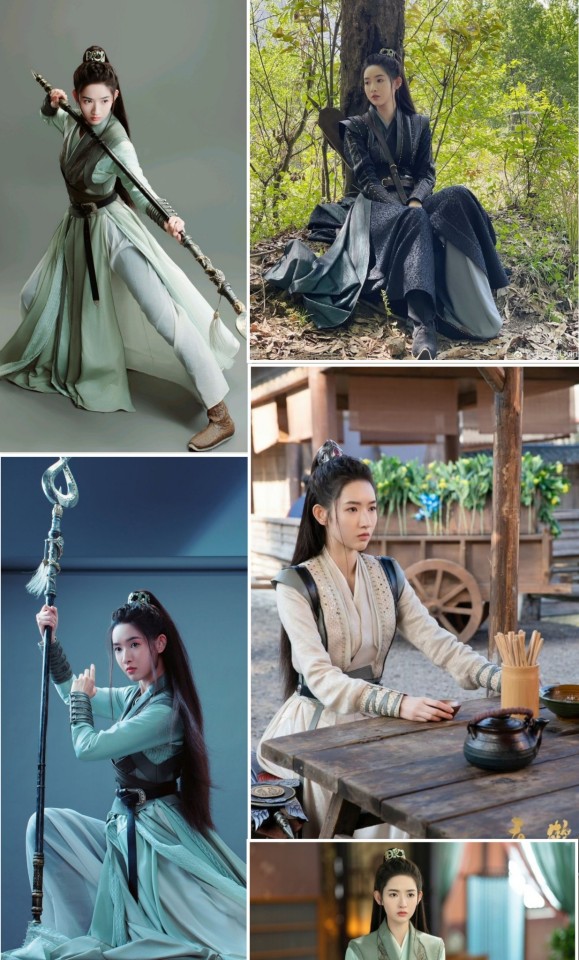
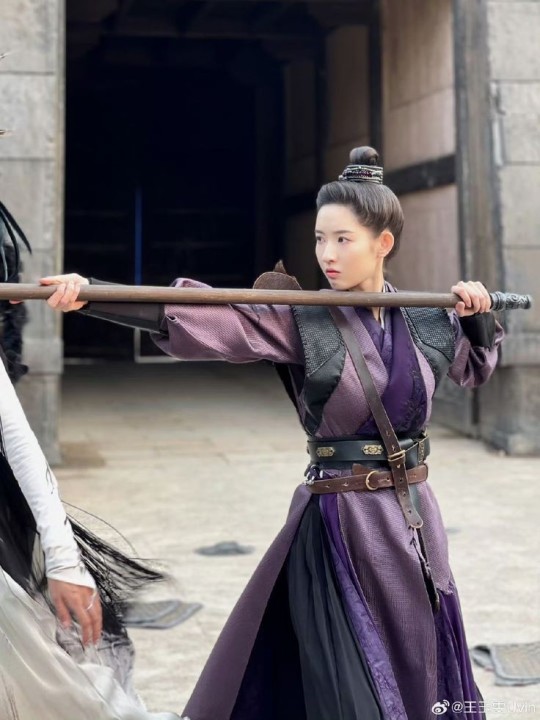
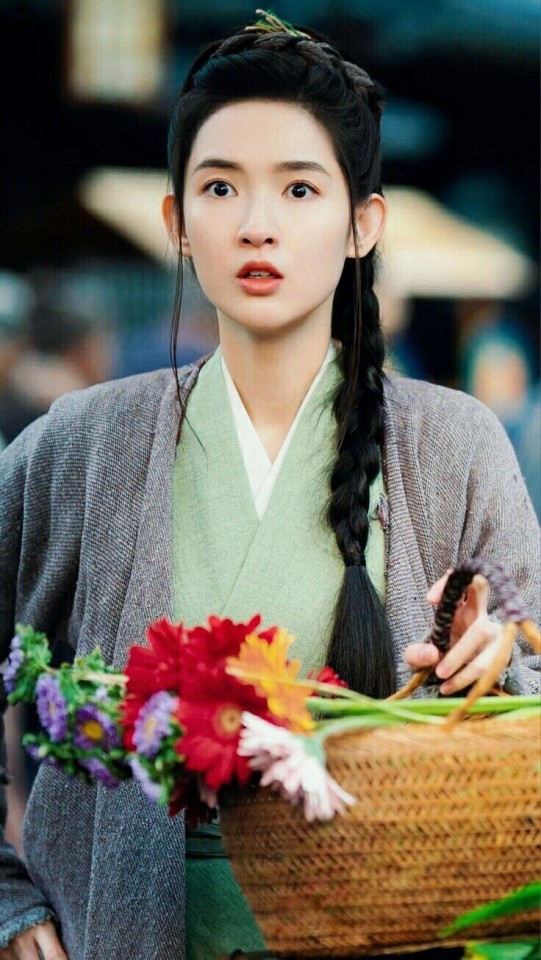


Character from Tiger & Crane :
Zhao Xintong, leader of Zhao Sect. and later the chief commander of the three armies. All her fight scenes were well thought of despite having to fight with a long ass spear 😤

I am glad I did not go by the reviews and gave this drama a try, even though the ending was not what I had expected!
There could have been more loving moments between Hu Zi and her, that vagueness was unsatisfying.
All in all she's a pretty and graceful actress to have come across and I hope to see more of her work in the future ❤
🌸🌸🌸🌸🌸🌸🌸🌸🌸🌸🌸
#2023 drama fav awards#zhao xin tong#xintong#chinese drama#cdrama#wuxia#badass female characters#female leadership#strong female#so pretty#tiger and crane#wang yuwen
15 notes
·
View notes
Text
Their power walk 😂
#tiger and crane#chinese drama#cdrama#drama scene#wuxia#jiang long#hu zi#zhang ling he#qi xiaoxuan#wang yuwen#zhao xin tong#chen you wei#qian yu
9 notes
·
View notes
Text
Mr. Romantic and his three stooges 🤣
#zhang ling he#jiang long#wang yuwen#chen you wei#hu zi#qi xiaoxuan#zhao xin tong#wang yu qian#qian yu#chinese drama#cdrama#drama scene#wuxia#fantasy
8 notes
·
View notes
Text

#brave female lead#strong girl#female leadership#xintong#zhao xin tong#wang yuwen#martial arts#wuxia#tiger and crane#chinese drama#cdrama#drama scene
3 notes
·
View notes
Text
Listing Upcoming C-Drama's to watch :-
Fox Spirit Matchmaker : Love in Pavilion (Lead- Liu Shishi & Leon Zhang)
Fox Spirit Matchmaker : Red-Moon Pact (Lead- Yang Mi & Gong Jun) Released
Fox Spirit Matchmaker : Sword and Beloved (Lead- Li Yi Tong & Cheng Yi)
Legend of the Female General (Lead- Zhou Ye & Ryan Cheng)
The Princess Royal (Lead- Zhao Jin Mai & Zhang Ling He) Released
Love of the Divine Tree ( Lead- Deng Wei & Julia Xiang)
Guardians of the Dafeng (Lead- Dylan Wang & Tian Xi Wei) Released
Fangs of Fortune (Lead- Neo Hou & Chen Duling) Released
Love in the Desert (Lead- Fang Yulin & Hanikezi) Released
Snowy Night : Timeless Love (Lead- Joseph Zeng & Li Qin) Released
Reborn for Love (Lead- Jing Tian & Zhang Lingh He) Released
Shui Long Yin (Lead- Fang Yilun/Xiao Shunyao/Luo Yunxi)
Lady Revenger Returns from the Fire (Lead- Xu Lu & Wei Zheming)
A Dream Within A Dream (Lead- Li Yi Tong & Liu Yu Ning)
Thousand Fragrances (Lead- Song Wei Long & Ju Jing Yi)
Love Game in Eastern Fantasy (Lead- Esther Yu & Ding Yuxi) Released
Legend of Dark River (Lead- Gong Jun & Chang Hua Sen)
Dashing Youth (Lead- Neo Hou & Hu Lian Xin) Released
The Story of Pearl Girl (Lead- Liu Yuning & Zhao Lusi) Released
Lin Jiang Xian (Lead- Joseph Zeng & Bai Lu)
Fall in Love with a Fox (Lead- Wanyan Luo Rong & Xu Hao)
Echo of her Voice (Lead- Wei Zheming & Xu Jia Qi) Released
Snowfall (Lead- Gao Wei Guang & Nana Ouyang) Released
Go East (Lead- Tan Jian Ci & Zhou Yiran) Released
Moonlight Mystique (Lead- Bai Lu & Ao Rui Peng)
Ran Shuang Wei Zhou (Lead- Wang Yuwen & Tian Jiarui)
28 notes
·
View notes